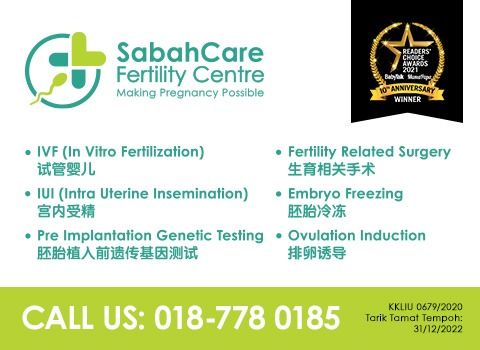As women get older, their chances to conceive decrease. Unlike man where sperm production is an ongoing process, women are born with eggs that constitute the entire lifetime supply and there is no new production throughout their lives.
At birth, the normal female ovary contains about one to two million eggs. When a girl enters puberty, only around 300,000 eggs remain. When a woman starts to ovulate, this number continues to deplete across her reproductive lifespan. At the age of 30, only 12 percent of the original number remains. At the time of menopause, virtually no eggs remain.

With increasing age, not only the quantity goes down, egg quality also declines. This means with increasing age, there is a higher percentage of abnormal eggs such that at the age of 40 and above, the majority of the eggs are abnormal. When an abnormal egg is ovulated, it is less likely to be fertilised. If there is fertilisation, the resulted embryo is less likely to implant in the uterus. When implantation does occur, the pregnancy often ends up with miscarriages.


This explains why the pregnancy rate decreases with age. It starts to drop after the age of 30. At the age of 30, women have 20 percent chance of getting pregnant each month. This percentage drops more rapidly after the age of 35. At the age of 40, the chance of getting pregnant each month is only 5%. Similarly, when couples go for fertility treatment, the chances of success decrease with female age. Among all fertility treatments, IVF (in vitro fertilization, or more commonly called test tube baby) has the highest success rates of around 30-40 percent. At the age of 35, success rates start to drop, and even more rapidly after the age of 40 to 20 percent and below. At the age of 45, it is almost 0 percent.

So what can we do?
The answer is clear that we should not delay our pregnancy plan until it is too late. Knowing the peak reproductive years are in the 20s to mid 30s, this is the time when chances to conceive are the highest. For couples facing fertility problems, i.e. unable to conceive after trying for one year, they should seek advice from fertility specialists without delay. However, for those who are older than 35 years old or having gynaecological diseases which may affect ovarian health, they should seek advice as early as possible rather than waiting for one year. Examples of their gynaecological conditions are endometriosis, polycystic ovarian syndrome, irregular periods, history of ovarian surgery and previous cancer treatments like chemotherapy or radiotherapy.
One of the useful blood tests which accurately measure our ovarian reserve is AMH (anti Mullerian hormone). The level indicates the number of eggs that remains in the ovaries. In the event of a low level, it serves as a warning not to delay the pregnancy plan further.
Smoking has been shown to reduce ovarian reserve and cause the ovaries to age prematurely. Overweight and obese women are less likely to conceive because they don’t ovulate. For those who manage to ovulate, the egg quality is also poorer. Therefore, to keep our ovaries healthy, it is important to have a healthy lifestyle, avoid smoking and alcohol, have regular exercise and maintain a normal weight.
In today’s society, more and more women are delaying childbearing for various reasons. One option is to freeze their eggs when they are young, preferably before the age of 35. When they decide to get pregnant later on in life, these frozen eggs can be used to achieve pregnancy through IVF, with success rates similar to a younger lady.
When egg freezing is not possible, women present to us at an older age, for example, age 45 and above, when ovarian reserve and egg quality are poor, the other option to consider will be egg donation. In Malaysia, this is only allowed for non-muslims.
In conclusion, female age is the most important factor in determining chances to conceive successfully, either naturally or through fertility treatments. Key messages from us fertility specialists are, not to delay pregnancy plans and fertility treatments, maintain a healthy lifestyle, other options available are egg freezing and egg donation.
SabahCare Fertility Centre recently bagged the BabyTalk Readers’ Choice Awards in the category of Fertility Centre (Sabah).
For more information, visit their website, Facebook page and
Instagram page.
By Dr Cheong Yee Tsing
MBBS (London), FRCOG (London), M.Med (O&G) (USM), Cert. IVF (UKM), AM (Mal),
Fellow in Reproductive Medicine & Infertility (Australia),
Consultant Obstetrician, Gynaecologist & Fertility Specialist.





